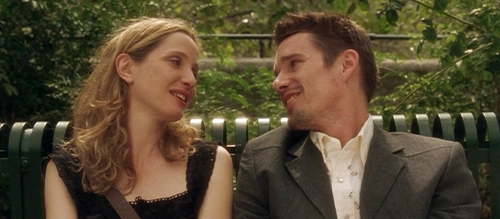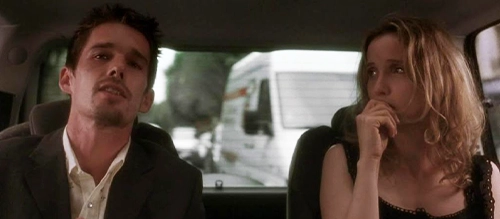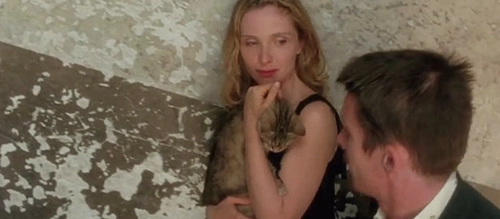Chasing the Present in ‘Before Sunset’
Before Sunset is a race against the clock on the perfect summer afternoon. It is one of those rare days where the sunlight casts everything in golden hues, and it feels as though anything is possible.
Released 20 years ago, on February 10, 2004, Before Sunset is the sequel to cult romance favorite directed by Richard Linklater, Before Sunrise (1995), and second in the Before Trilogy, followed by Before Midnight (2013). In Sunrise, Jesse (Ethan Hawke) and Celine (Julie Delpy) are fresh-faced and falling in love in a whirlwind night full of conversation while walking the streets of Vienna. They remark that it feels like they exist outside of time, in a dream only the two of them know about, and decide to part without sharing information. Agreeing to reunite at the train station in six months, the young lovers part ways.
Set nine years later and shot on location in Paris, Before Sunset was co-written by Linklater and charismatic stars Hawke and Delpy. Sunset takes a similar approach, valuing character, chemistry, and conversation above all conventions of American cinema. It is fittingly set in the city that spawned the French New Wave movement, with its monologue-heavy style and free form, it feels at once engrossing and mundane. If Sunrise is about imagining the future and Midnight is about reflecting on the past, Sunset is about attempting to live in the present.

Now in their early 30s, Jesse is in Paris at the last stop on his book tour, fielding questions about the novel, which describes in great detail his experiences with a French girl he met on a train and spent a life-changing night with. He then describes his idea for his next book, which he imagines takes place during the span of a pop song, wherein his protagonist exists in two moments simultaneously: the past and the present. It is at this very moment he sees Celine for the first time since they were 23 in Vienna. He incredulously continues his thought, which describes this very surreal moment. “For a moment, all his life is folding in and it’s obvious to him that time is a lie… it’s all happening all the time and inside every moment is another, all happening simultaneously.”
It serves as almost a mission statement from the writing trio, who skilfully and magically capture the feeling of attempting to live in the present when the past stands in front of you after living only in your mind for so long.
Before Sunset unfolds in real-time. With a runtime of less than 80 minutes (including credits), it spans a leisurely stroll through the streets and parks of Paris, with a stop in a cafe for coffee and a cigarette, and finally a song. The film feels utterly naturalistic, as if we are watching a long conversation between two people who never had closure and who never shook their first real connection with someone. However, it is never boring. There is an immediacy in their performances, conversation, and chemistry that makes every caught breath, every stolen glance, exciting. To achieve this naturalism, the Before Trilogy was counterintuitively rehearsed and scripted meticulously. Always completed on tight budgets and schedules, the films were each rehearsed for weeks, not unlike a play, to convey a sense of spontaneity, with hand motions, coughs, and apparent off-the-cuff moments all scripted. Particularly with the rise of indie mumblecore in the early 2000s, which often has a limited script, the trilogy is often also expected to have been improvised, but it took the team immense time and effort to make it look effortless and to perfect those long walking-and-talking takes that the trilogy is so famous for.
“Memory is a wonderful thing if you don’t have to deal with the past,” Celine remarks. They keep turning back to the past, sharing stories from their childhoods and from relationships they’ve had since their one night stand. Yet, they also continuously try to return to the present. The time constraint — Jesse has a plane to catch, and Celine keeps reminding him of this — pulls them back, at least briefly, into the moment, because they don’t want this dreamlike second encounter to end. Neither wants the present to become another time that they will think about while asleep next to a new partner.
Before Sunset is at once a lesson in restraint and in baring it all. The two do not share a kiss, yet it is a movie bursting with desire. In their long conversation, Jesse purposely avoids the topic of his wife and child, and Celine even forgets about the man she says she’s in love with. Sunset begins with surface-level conversation that quickly delves into more serious topics. The familiarity from their encounter years ago allows these walls to slowly but surely weaken as time ticks on. Celine, more foul-mouthed at 32 than at 23, wiggles her fingers and tells Jesse to say stop. He does, and she raises her middle finger at him. It’s a surprise that is cheekily brushed over with a quick half-embrace. When it happens a second time, after they’ve laid all their cards on the table, it feels like they are no longer only teasing each other, but time itself is teasing them both. Despite being older and more confident in who they are and what they want, the clock is still ticking as the sun sinks lower in the August sky.

This mystical reunion is confirmation that their time dwelling on the past wasn’t for nothing. They also come to confess that they are sure now that this reunion wasn’t a happenstance, like their initial meeting. Jesse wrote his book with hopes of not just remembering that night forever, but to put it out into the world for Celine to see. And she did; she read the book twice, seeing herself through his eyes, and found out about his book tour stop at her favorite bookshop. Neither initially admits how much they felt, and feel, for each other, but it is obvious in their longing words and body language.
They find escape and chemistry in each other, and want desperately to be in love with life and with a passionate partner. “Desire is the fuel of life,” they agree early on. Their confessions culminate in an emotional, extended car ride back to Celine’s apartment. Jesse says he is wired to be dissatisfied, searching for issues and struggling to reconcile the man he thinks he should be with the man he knows he is: someone who enjoys the chemistry and the chase, but not the commitment. Meanwhile, he praises Celine for being connected to the world through her environmental activism, but she puts up walls to prevent further damage, feeling irrevocably changed and more cynical after their night together all those years before.
He tells her that she can’t avoid pain at the expense of engagement. But in a sense, that is what they are both doing. Jesse wears his heart on his sleeve, but he struggles to find a way to create a life where he can make his son happy when he and his wife don’t get along anymore. When they both fully admit to their shared misery, over what could have been in Vienna but was lost when they did not reunite, and the deep dissatisfaction with both of their love and sex lives, a final wall breaks down.

Early in Before Sunset, over coffee and a shared cigarette, Celine asks Jesse what his problems are. The light in his eyes grows as the film goes on and they both get closer and closer to embracing the melding of the past and present. He replies, honestly, “Right now, I don’t have any. I’m just damn happy to be here.”
In the longest silence of the film, Celine leads Jesse up to her apartment. On the winding stairway, they slowly walk, perhaps imagining what will take place when they’re alone together, privately, for the first time in forever. Neither wants this dream to end. He insists she play him a song she’s written, which turns out to be a waltz about their initial encounter. He lounges deeper into her couch as she dances to and imitates Nina Simone as “Just in Time” plays. (Lyrics include, “Now you’re here now I know just where I’m going / No more doubt or fear I’ve found my way / Your love came just in time you found me just in time / And changed my lonely nights that lucky day.”)
Both are, finally, blissfully, lost in the moment. For all of their beautifully written monologues philosophizing about whether or not people can change, what the responsibilities of a romantic partner are, whether men and women can fulfill each other in modern society, it is the closing lines that achieve the simple but sublime moment of presence. Acknowledgement of time passing, and joy in response.
“Baby, you are gonna miss that plane.”
Jesse leans back, light reflecting off the wedding ring he fiddles with, as he laughs.
“I know.”
Recommended for you: The Before Trilogy: How to Capture a Moment
Written by Kyra Lieberman
You can support Kyra Lieberman in the following places:
Portfolio: Kyra Lieberman
Blog: & More
X (Twitter): @kyralieberman
Instagram: @kyralieb

